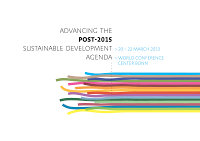From 20-22 March, Civil Society from around the world met for a conference entitled “Advancing the Post-2015 Sustainable Development Agenda: Reconfirming Rights – Recognising Limits – Redefining Goals” in Bonn, Germany. This global conference brought together nearly 300 civil society activists and representatives from key stakeholders in order to offer inputs into the Sustainable Development and Post-2015 discussions, and to agree on joint demands and strategy for a post-2015 development agenda.
In the opening speech, Minister Dirk Niebel, Federal Ministry for Economic Cooperation and Development, Germany pointed out that after all, improving people’s living conditions and making sure that vital natural resources will still be there in the long term are two sides of the same coin. In the Minister’s view, three things are especially important for the post-2015 agenda. First, the international goals should address all major aspects of inclusive and sustainable development. But at the same time they should remain manageable and understandable. Second, the set of goals should apply to all countries on a global scale. But at the same time it must be designed to address country-specific issues. Third, it is also important to link the post-Millennium Development Goals (MDG) process closely to the Sustainable Development Goals (SDG) process. The conference provided an opportunity for the International Resource Panel to show some of Africa’s main challenges: resource sector down to 24% of GDP, but still 80% of exports rise of resource wars; 20 of the top 30 failing states are in Africa; 30% of all Africans are undernourished; ecosystem degradation: 65% of agric soils degraded; Africa will suffer most from climate change having contributed least; the urbanisation rate was 375 million in 2010, and will increase to 1.2 billion by 2050. More information is available here.
The conference recalled that climate change is an urgent issue for humanity. It is a justice, political, economic and security issue which is already hampering the fulfillment of social, human and economic development, as well as the realisation of some basic human rights, such as the right to food. Climate change has multiple equity dimensions on international and national levels; as well as across intergenerational and intragenerational lines. Groups who have done the least to cause climate change, such as the world’s poor, women and indigenous people, are most vulnerable to its impacts. Find the full session statement on climate change here. The conference outcomes, including many statements available for endorsements, are available here.

